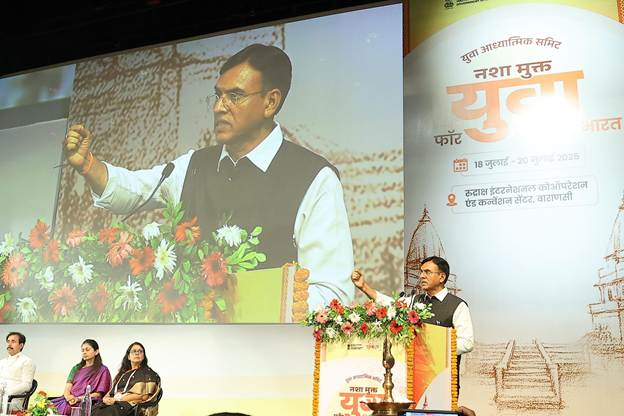‘Yuva Spiritual Summit’ in Varanasi Unites Youth for Drug-Free India by 2047
Dr. Mandaviya emphasized that India’s vast youth demographic — comprising 65% of the population under the age of 35 — is the nation’s most potent resource, but also its most vulnerable.

- Country:
- India
In a historic convergence of youth energy and spiritual wisdom, the Ministry of Youth Affairs and Sports has launched the ‘Yuva Spiritual Summit’ in Varanasi, Uttar Pradesh, under the unifying theme: “Drug-Free Youth for a Developed India”. The summit, which commenced on July 19, brings together over 600 young delegates from 122 spiritual and socio-cultural organizations across the country, marking a powerful beginning to a transformative grassroots movement rooted in India’s moral and cultural values.
Hosted in one of the world’s oldest living cities, the summit aims to craft a robust, faith-led, and youth-driven national response to the growing challenge of substance abuse. It also forms a key milestone in the roadmap toward Amrit Kaal, a vision set forth by Prime Minister Narendra Modi to transform India into a fully developed nation by 2047, when the country will celebrate 100 years of independence.
Dr. Mansukh Mandaviya Sets the Vision for a Drug-Free Future
Addressing the inaugural session, Dr. Mansukh Mandaviya, Union Minister for Youth Affairs & Sports and Labour & Employment, invoked the Prime Minister’s ‘Panch Pran’ (Five Resolves) outlined during the 76th Independence Day celebrations in 2022. Dr. Mandaviya emphasized that India’s vast youth demographic — comprising 65% of the population under the age of 35 — is the nation’s most potent resource, but also its most vulnerable.
“Our youth are not just stakeholders of tomorrow; they are the torchbearers of today. But their future is under threat from drugs, digital distractions like mobile phones and reels, and the lack of moral direction,” Dr. Mandaviya stated.
He called upon spiritual leaders, community elders, and social influencers to use their platforms to dispel myths, promote mental resilience, and cultivate a positive lifestyle through cultural, religious, and civic education.
Dr. Mandaviya stressed that a “movement, not a moment” is needed—urging every citizen to pledge to motivate at least five others to join the campaign for a Nasha-Mukt Bharat (Drug-Free India).
Summit Highlights: Themes, Dialogues, and Strategy Building
Structured over two days, the summit features four thematic sessions that combine expert lectures, panel discussions, interactive whiteboards, and youth-driven brainstorming exercises. These sessions cover the following critical areas:
-
Understanding Addiction and Its Psychological & Social Impacts Experts from the fields of neuroscience, behavioural psychology, and rehabilitation are helping participants decode how addiction hijacks the brain, disrupts social structures, and devastates communities.
-
Breaking Drug Trafficking Networks and Commercial Ecosystems Law enforcement professionals and anti-narcotics specialists are shedding light on the dark economy behind drugs, revealing how youth are often targeted by sophisticated supply chains and digital pushers.
-
Designing Youth-Centric Campaigns and Outreach Strategies Delegates are learning the art of social media activism, peer counselling, and community engagement, aimed at making anti-drug messages viral, empathetic, and accessible.
-
Building a Sustainable, National Commitment Towards 2047 Through collaborative whiteboard platforms, participants are co-developing policy suggestions, school-based interventions, and ideas for pan-India volunteer networks to support ongoing de-addiction efforts.
Kashi Declaration: A Youth-Led Charter for National Transformation
The summit will culminate on July 20 with the formal release of the ‘Kashi Declaration’—a youth-drafted charter capturing the collective intent, strategy, and moral vision to eradicate drug abuse by 2047. This document is expected to:
-
Serve as a guiding policy framework for central and state governments
-
Inform civil society outreach and NGO program design
-
Act as a manifesto for student groups, faith-based institutions, and youth clubs
-
Inspire further academic research and de-addiction innovation projects
It will be widely disseminated through ministries, universities, and community networks, further amplifying the call for a Nasha-Mukt, Viksit Bharat.
Strategic and Symbolic Significance of Varanasi
Hosting the summit in Kashi (Varanasi)—a city symbolic of spiritual awakening—adds profound meaning to the initiative. The location offers a moral and cultural backdrop that strengthens the narrative that drug prevention must be rooted in inner awakening, not just outer enforcement.
This initiative also aligns with the broader campaign by the Ministry—‘Fit India Sundays on Cycle’ and the newly launched ‘Nasha Mukt Yuva for Viksit Bharat’—creating a multi-pronged, lifestyle-focused approach to youth wellness.
Spirituality Meets Strategy for National Rejuvenation
The Yuva Spiritual Summit represents a fusion of faith and public policy, youth energy and elder wisdom, and grassroots activism and national vision. As India races toward 2047, the summit offers a crucial reminder: true development cannot happen without healthy, empowered, and addiction-free citizens. With strong moral guidance and coordinated civic action, India is laying the groundwork for a future where spirituality, service, and self-discipline steer the nation’s youth away from darkness and into leadership.










